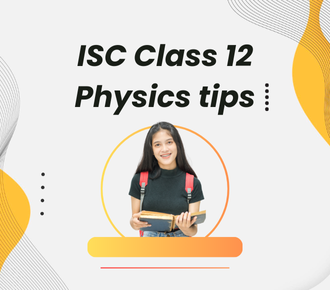- 9:30am - 6:30pm, Mon - Sun
- +91 7836034313
- R2-149 first floor M3M Cosmopolitan, sector 66 Gurugram 122102

Physics is often considered one of the most challenging subjects in ISC Class 12 Physics, but with the right strategies, it becomes manageable and even enjoyable. This comprehensive guide is designed to help students not only cover the syllabus but also practice efficiently, avoid common mistakes, and focus on high-scoring areas.
If you're searching for ISC Class 12 Physics tips, notes, or a detailed understanding of the ISC Class 12 Physics syllabus, you’ve come to the right place. This exam-focused guide offers chapter-wise priorities, past year questions (PYQs), common pitfalls, and actionable advice to help you excel in your board exams.
For further assistance, connect with expert tutors at [/tutors], try structured lessons with a [/free-trial], check affordable plans at [/pricing], or find the best tutor in your area at [/city/gurugram/home-tutor].
Before diving into study, it’s essential to know the structure of the syllabus. The ISC Class 12 Physics syllabus covers key concepts and numerical problems from classical physics to modern physics.
Electrostatics:
Electric charges, Coulomb’s law, electric field, electric potential
Capacitors and their applications
Current Electricity:
Ohm’s law, Kirchhoff’s laws, Wheatstone bridge
Electrical power and energy calculations
Magnetic Effects of Current and Magnetism:
Biot–Savart law, Ampere’s circuital law
Earth's magnetism, magnetic field lines
Electromagnetic Induction and Alternating Currents:
Faraday’s law, Lenz’s law
AC circuits, power factor
Optics:
Reflection, refraction, lens formula
Wave optics, diffraction, polarization
Dual Nature of Radiation and Matter:
Photoelectric effect, de Broglie wavelength
Atoms and Nuclei:
Radioactivity, nuclear reactions
Semiconductor Electronics:
PN junction diode, transistors, logic gates
This structured syllabus helps you understand where to focus your time and effort.
Certain chapters carry more weight and appear more frequently in exams. Prioritizing them ensures better results.
Electrostatics: Important derivations and problems
Current Electricity: Numerical problems are frequently asked
Magnetic Effects of Current: Diagrams and laws have high weightage
Optics: Lens, mirrors, and numerical problems
Electromagnetic Induction: Complex concepts like AC circuits
Atoms and Nuclei: Radioactivity and nuclear reactions are always asked
Dual Nature of Radiation: Theory-heavy but scoring if concepts are clear
Semiconductor Electronics: Logic gates and circuits are often part of structured questions
Complex derivations rarely asked in detail
Sections that are covered under optional or supplementary questions
Here’s how you can tackle your Physics exam efficiently.
Physics is conceptual. Rote learning will not help you. Spend time understanding the 'why' behind formulas and laws.
Solve problems from past year papers
Time yourself to simulate exam conditions
Focus on units and accuracy
Write formula sheets and important derivations
Create charts for laws and constants
Keep diagrams neat and labeled
Allocate 30 minutes daily for revision
Use quick notes and formula sheets
Revise weak areas twice before moving on
Diagrams in optics, circuits, and magnetic fields are scoring sections. Practice drawing them with proper labeling.
Helps in understanding recurring themes
Improves speed and accuracy
Provides insights into expected question patterns
Writing incorrect formulas due to haste
Ignoring units in numerical problems
Overlooking diagrams and definitions
Failing to read questions carefully
Not managing time during the exam
Derive the expression for potential energy
Explain the capacitance of parallel plates with a diagram
Solve problems on Wheatstone bridge and meter bridge
Calculate energy consumption in household circuits
Use Biot–Savart law to derive the magnetic field due to a current element
Explain Earth's magnetic field and its components
Explain the working of an AC generator with a diagram
Solve problems on self-inductance and mutual inductance
Derive lens formula and explain magnification
Practice numerical problems on refraction and reflection
Explain the photoelectric effect with energy conservation equations
Solve problems on half-life and nuclear decay
Skipping Conceptual Understanding:
Memorization without comprehension leads to confusion in problem-solving.
Ignoring Units and Signs:
Errors in units can lead to full mark loss in numerical problems.
Poor Diagram Presentation:
Half-mark questions are lost when diagrams are incomplete or wrongly labeled.
Not Practicing Enough Problems:
Physics requires repeated practice; a one-time study won’t be enough.
Neglecting Revision:
Without revision, formulas and derivations are forgotten during exams.
Mismanaging Time in Exams:
Attempting questions in random order can cost valuable time.
Week 1:
Study Electrostatics and make formula sheets
Solve problems on electric fields and potential
Week 2:
Practice Current Electricity problems
Revise definitions and laws
Week 3:
Focus on Magnetism and Electromagnetic Induction
Draw diagrams and attempt past paper questions
Week 4:
Study Optics and practice numerical problems
Solve problems from lens and refraction chapters
Week 5:
Cover Dual Nature of Radiation and Atoms & Nuclei
Revise constants and decay equations
Final Week:
Take mock tests
Focus on weak areas identified in tests
Revise formula sheets and important diagrams
Track your progress with this checklist.
✅ Reviewed all major formulas
✅ Practiced numerical problems daily
✅ Prepared diagrams for circuits and optics
✅ Solved at least 5 past year papers
✅ Focused on units and accuracy
✅ Made notes for definitions and laws
✅ Timed practice sessions completed
✅ Identified weak areas and revised them
✅ Used formula sheets for quick revision
✅ Maintained a calm and positive mindset
[Download ISC Class 12 Physics Checklist PDF]
Expert guidance makes a huge difference when tackling difficult subjects like Physics.
Connect with our experienced tutors at [/tutors]
Try structured lessons with a [/free-trial]
Explore affordable plans at [/pricing]
Find expert home tutors in your area at [/city/gurugram/home-tutor]
Preparing for ISC Class 12 Physics doesn’t have to be stressful. With a clear understanding of the syllabus, prioritized chapters, regular practice of numerical problems, and strategic revision, you can confidently face the exam. Avoid common mistakes, manage your time effectively, and stay focused on conceptual learning.
This guide equips you with the tools and resources you need — from actionable study tips to downloadable checklists — to achieve top results. Stay consistent, practice smart, and your hard work will pay off.
Start today, revise regularly, and approach the exam with confidence!








